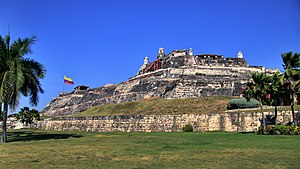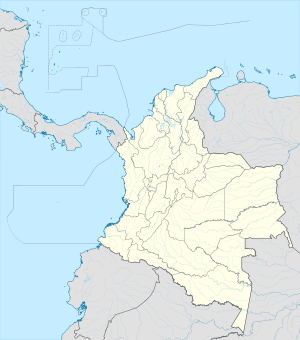San Felipe de Barajas Castle
| Castillo San Felipe de Barajas | |
|---|---|
| Cartagena, Colombia | |

Castillo San Felipe de Barajas
|
|
| Coordinates | 10°25′20″N 75°32′17″W / 10.42222°N 75.53806°W |
| Type | Bastion, Fortress |
| Site information | |
| Owner | Colombia |
| Controlled by | Colombia |
| Open to the public |
Yes |
| Condition | well preserved |
| Site history | |
| Built | 1536–1767 |
| Built by | Antonio de Arévalo |
| In use | 1536–present |
| Materials | Stone |
| Battles/wars |
Raid on Cartagena (1697) Battle of Cartagena de Indias (1741) |
| Garrison information | |
| Past commanders |
José de Herrera y Sotomayor (1739–41) |
The Castillo San Felipe de Barajas is a fortress in the city of Cartagena, Colombia. The castle is located on the Hill of San Lázaro in a strategic location, dominating approaches to the city by land or sea. It was built by the Spanish during the colonial era. Construction began in the year 1536, and it was originally known as the Castillo de San Lázaro, It was expanded in 1657.
The fortress was begun in 1536. It was significantly expanded in 1657. It was built in a triangular shape on top of the hill, with eight batteries and a garrison of 20 soldiers and 4 gunners. Its name was given in honour of Philip IV of Spain. Another expansion was made to the fortress in 1763 by Antonio de Arévalo.
In the 1697 raid on Cartagena, during the War of the Grand Alliance, the castle fell to the French privateer Baron de Pointis. The castle was repaired by José de Herrera y Sotomayor in 1739. British Admiral Edward Vernon attacked the fortress in the 1741 Battle of Cartagena de Indias, an important conflict of the War of Jenkins' Ear. Vernon's forces were repelled by the Spanish admiral Blas de Lezo.
During the Spanish American wars of independence by mid-1815 a large Spanish expeditionary force under Pablo Morillo had arrived in New Granada. Cartagena fell in December, and by May 1816 the royalists had control of all of New Granada.
The fortification consists of a series of walls, wide at the base and narrow toward the parapet, forming a formidable pattern of bunkers. The batteries and parapets protect one another, so making it practically impossible to take a battery without taking the whole defence system. The castle is striking for its grand entrance and its complex maze of tunnels. It is the most formidable defensive complex of Spanish military architecture. It is 41 meters (135 ft.) above sea level.
...
Wikipedia

